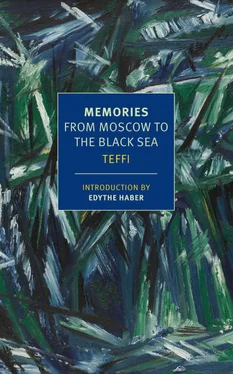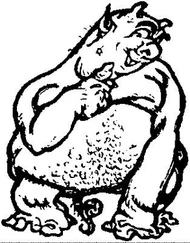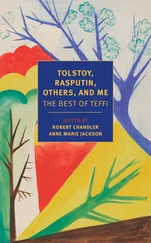The Russian word mestechko (literally “little place”) was used for settlements too large to be classed as villages but too small to be classed as cities. From 1791, Jews were generally only permitted to live within “the Pale of Settlement” (a region roughly corresponding to present-day Belarus, western Ukraine, eastern Poland, and the Baltic republics). Even within the Pale, Jews were generally prohibited from living in either large cities or small villages. Most Jews, therefore, lived in shtetls. In April 1917, the Pale of Settlement was abolished.
Maximilien de Robespierre (1758–1794) was one of the most important figures of the French Revolution. Accused of being the “soul” of the Reign of Terror, he was arrested and executed in July 1794.
The shtetl Teffi and her companions have just reached is Unechka, in Bryansk province. For a few months this unremarkable town assumed great importance, as the frontier station on the main route between Moscow and Kiev. The Cheka was exceptionally active there, not only seizing valuables from those trying to leave Soviet Russia but also guarding against infiltration from the Ukraine, which, from March until December 1918, was under German occupation.
Vsevolod Meyerhold (1874–1940) was an influential and innovative theater director. In an article written after his death, Teffi explains that the three corners of his “magic triangle” were the actor, the author, and the director and that Meyerhold believed that the author and the actors should communicate with one another via the director (i.e. along the two short sides of the triangle), rather than directly (i.e. along the hypotenuse). Teffi clearly disagreed with all this, observing sarcastically, “The director always sees the author as the enemy of the play. The author’s observations only mess things up. The author wrote the play, but it is the director, of course, who best understands just what the author wanted to say ( Moya letopis’ [Vagrius, 2004!], p. 187). As for the young actress, she blends Meyerhold’s terminology with the political jargon of the time; Trotsky, Bukharin, and others often spoke of “parallelograms of forces.” Teffi knew Nikolay Yevreinov well (see note 9); a theater director associated with Russian Symbolism, he spent most of his last thirty years in Paris. Commedia dell’Arte developed in Italy in the sixteenth century; it emerged from Carnival and is characterized by the use of masks and the central role played by such stock characters as Arlecchino (Harlequin) and Pulcinella (Punch). “Theater as collective ritual” alludes to the theories of the Symbolist poet Vyacheslav Ivanov (1866–1949). He dreamed of a new type of mass theater—a “collective action,” modeled on ancient religious rituals, Athenian tragedy, and medieval mystery plays.
A reference to zaum , the “transrational” or “beyond-mind” language advocated by the Futurist poets Alexey Kruchonykh and Velimir Khlebnikov. It was Kruchonykh who coined this word, brilliantly translated by the late Paul Schmidt as “beyonsense.”
This commissar was, in reality, Fruma Khaikina (1897–1977), who adopted the surname “Rostova,” after Natasha Rostova in War and Peace. She was head of the local Cheka and a member of the town’s “RevKom”—that is, Revolutionary Committee. In late 1918 she married Mykola Shchors (1895–1919), a Ukrainian Red Army commander elevated after his death to almost legendary status. She was notorious for her brutality.
One of the banknotes issued by the Provisional Government whose last prime minister, in the summer and early autumn of 1917, had been Alexandr Kerensky. The Soviet government continued to print these notes until 1919, so the general was doing nothing illegal.
The poem Olyonushka recites is “ Angelika ” (included in Passiflora , 1923). Fedosya dies alone in a ditch and is taken up by angels into the presence of Christ and the Virgin Mary.
In Gogol’s story “Christmas Eve” (1832), the blacksmith makes the sign of the cross over the devil. This forces the devil to let the blacksmith ride on his back.
A song written in 1906, to honor those who had died in the Russo-Japanese war of the previous year. During and after the Civil War the song was sung by both Whites and Reds.
The Imperial Petersburg Institute of Technology, founded in 1828.
A popular satirical magazine. See note 2.
A Polish form of address, once the equivalent of the English “Sir.” Since the late nineteenth century, it has been closer to “Mr.”
“Where is Moscow?” (Yiddish)
“What a little scholar he is!” (Yiddish, probably meant ironically)
“The crazy head!” (Yiddish, colloquial)
George Boreman was the owner of a successful Petersburg chocolate factory, nationalized in 1918.
In an article published in Kiev in January 1919, Teffi is more critical of Russian condescension towards the Ukrainian language. Many of the Ukrainian words that Russians find so risible, she points out, are in fact more Slavonic than their Russian equivalents, which are often borrowings from French or German. She continues, “I cannot understand why they are so irritated by the free existence of the Ukrainian language. […] What has happened? Is it really so terrible to have to learn the couple of dozen words one needs to get by in the Ukraine? Far more terrible are all these mindless ‘orientations,’ ‘evacuations,’ ‘demobilizations,’ and ‘democratizations’ that now litter our Slav speech.” ( Teffi v strane vospominanii : LP Media 2011, p. 215)
The actress Vera Ilnarskaya (1880–1946) was married to Lolo, a writer with whom Teffi sometimes collaborated. She published the journal The Spotlights and Life ( Rampa i zhizn’ ). See note 8.
A salty East European dish made from minced meat, anchovies, or herring, together with onions.
Teffi’s train did indeed pass through Gomel, which lies about 300 kilometers to the north of Kiev, in what is now Belarus. Shavli (or Siauliai), however, lies in present-day Lithuania, not far from the Baltic; it could not possibly have been on their route. Gooskin’s geography is confused.
“Out!” (German).
Olyonushka’s first two words mean, “The exceptions are…” She then comes up with a number of verbs that are exceptions to some grammatical rule.
“This was in Schöneberg” (a part of Berlin).
Schon means “already”; nun means “now.”
At the end of the nineteenth century Jews constituted nearly forty percent of the population of Odessa. The ever-alert Gooskin, with his colorful way of speech, answers perfectly to the Russian stereotype of a Jewish Odessan businessman. The quintessential Russianness of his first name and patronymic is therefore unexpected. It is this that makes everyone laugh.
Anatoly Durov (1865–1916) and his elder brother Vladimir (1863–1936) were famous trainers of circus dogs. Unlike most trainers before them, who had relied on pain and fear, they used mainly positive encouragement—the carrot rather than the stick.
Читать дальше












